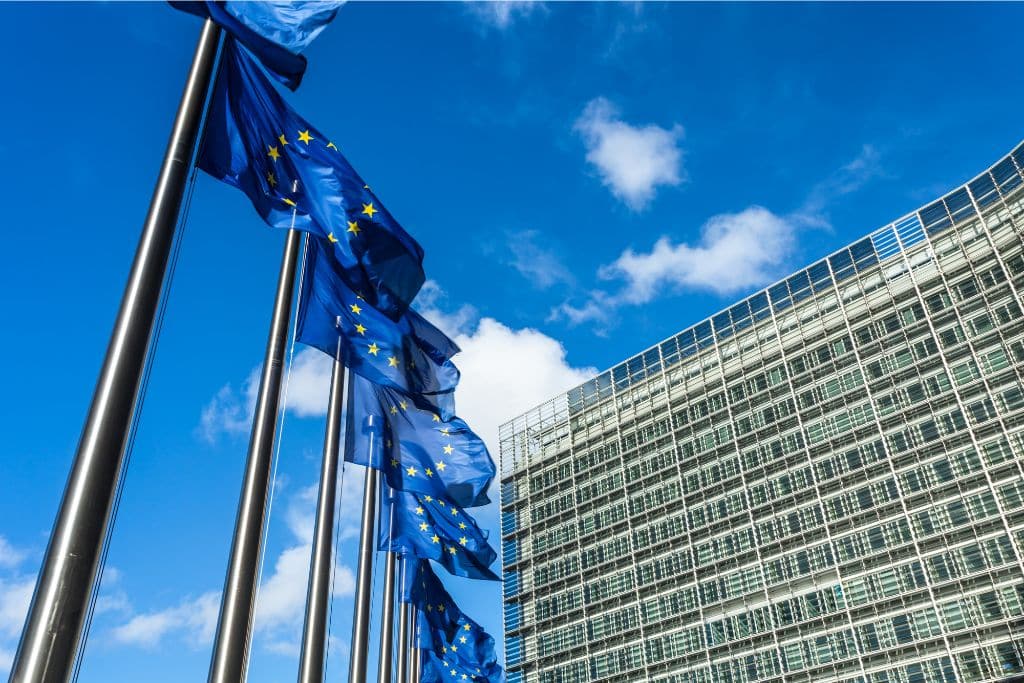MEPs backed key legislation that forms the backbone of the EU landmark climate policies, including reform to the carbon market, the extension of emission trading schemes, and a new Social Climate fund to support vulnerable parties during the energy transition. Now, the deal needs to be formally ratified by the EU Council.
—
The European Parliament on Tuesday approved three sweeping pieces of legislation to make EU climate policies more ambitious, including new rules for high-carbon goods imports and a reform of the Emissions Trading Scheme (ETS), despite resistance from the French Green Party and other MEPs who warned it would spark public opposition to rising energy costs.
The deals approved on Tuesday are part of the “Fit for 55 in 2030 package”, the bloc’s plan to reduce greenhouse gas emissions by at least 55% by the end of the decade compared to 1990 levels, in line with the European Climate Law.
A large majority of MEPs voted in favour of the deal agreed upon last year by negotiators from EU member states and Parliament to upgrade the carbon market to cut emissions by 62% from 2005 levels by 2030, up from the current 43% reduction target. Under the upgrade, companies will lose the free CO2 permits they currently receive by 2034.
Launched in 2005, the EU ETS, a cornerstone of the EU policies to fight climate change and reduce greenhouse gas emissions cost-effectively, is the second-largest carbon market in the world and is linked to limiting emissions from 10,000 different installations in the power sector, combustion plants, oil refineries, and airlines. Since its introduction, the bloc managed to cut emissions by around 43% in these sectors.
Carbon permits, which companies can buy and sell under the ETS, have risen from around €20 to €100 a tonne over the past two years. It is the first time that allowances traded under the emissions trading system have surpassed the symbolic triple-digit mark, a price that, analysts suggest, will incentivise companies to start considering less polluting alternatives or investments in technologies such as carbon capture and storage.

EU carbon permits price in the last 5 years. Graph by Trading Economics.
The Parliament also voted to include GHG emissions from the maritime sector in the ETS. The decision, which was negotiated by EU lawmakers and agreed upon in December, effectively forces vessels to pay for their carbon dioxide, methane, and nitrogen dioxide emissions for voyages within the bloc, adding pressure to scale up green infrastructure and technologies. Starting in 2024, shipping companies will have to buy carbon permits to cover at least 40% of their emissions. By 2026, these will have to cover 100% of emissions.
MEPs also agreed to the revision of the ETS for aviation, which will phase out allowances to the sector by 2026 and promote the use of sustainable aviation fuel (SAF). A separate ETS II will put a price on GHG emissions on road transport and buildings in 2026 or 2027 if energy prices are exceptionally high.
167 MEPs from green, leftwing, and far-right groups contested the plan to expand the scheme, warning it would spark public opposition to rising energy costs.
2 years ago we presented the laws to deliver the #EUGreenDeal
With today’s votes, we reach another milestone.
I want to thank @Europarl_EN for its support, and call on Member States to now take the final steps.
Together, we will make Europe the first climate neutral continent.
— Ursula von der Leyen (@vonderleyen) April 18, 2023
Lawmakers also approved the world-first plan to phase in a price on imports of high-carbon goods from 2026, including steel, cement, aluminium, fertilisers, electricity, and hydrogen, a plan designed to create a more level playing field between the bloc and non-EU producers.
Mohammed Chahim, lead MEP on the file, told Euronews that the Carbon Border Adjustment Mechanism (CBAM) will incentivise countries outside the EU to step up efforts in decarbonising the economy and keep the 1.5C goal within reach.
“It is an absolute game changer and it’s really historic because for the first time we will start asking producers to pay for also the imported CO2 emissions,” he said.
With 521 votes to 75 and 43 abstentions, lawmakers on Tuesday also agreed on a deal to set up an EU Social Climate Fund (SCF) in 2026. A total of €86.7 billion (US$97.2) in funding to support vulnerable European households, micro-enterprises, and transport users particularly affected by the climate transition and rising energy costs.
EU Commission president Ursula von der Leyen welcomed the new deals, saying both the ETS and the CBAM will incentivise companies and trade partners to invest in clean tech and decarbonisation. She added that the new legislation will bring Europe on the right path to becoming the world’s first climate-neutral continent.
They now have to be formally endorsed by the European Council. Only then they will be published in the EU Official Journal and enter into force 20 days later.
You might also like: Environmental Groups Sue EU Over Green Label for Gas and Nuclear


















